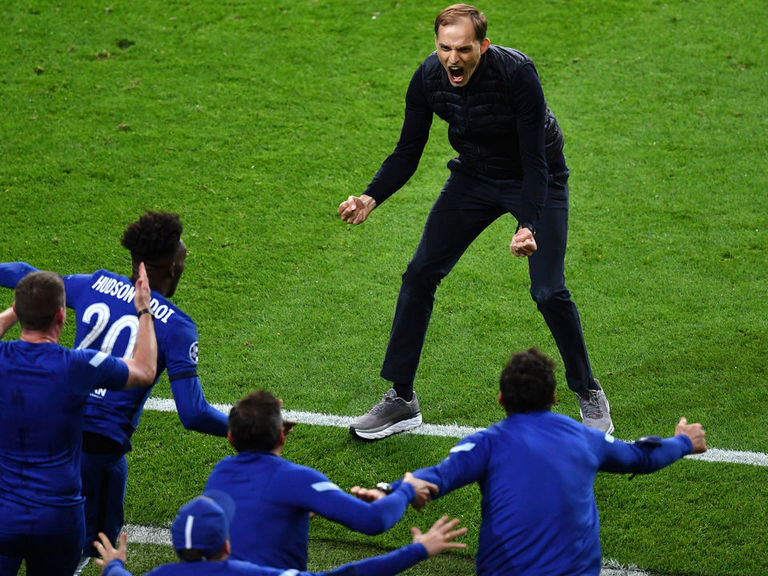Instant success: How Tuchel's crash course in tactics made Chelsea unstoppable

Once Chelsea went up 1-0 in Saturday’s Champions League final, the game was – for all intents and purposes – over. Whenever Manchester City sought an opening, desperately at times, they found a dead end. The Blues have found the most comfort in the tightest of margins – and their opponents the most pain.
Chelsea won the Champions League doing what they’ve done almost exclusively since Thomas Tuchel took charge in January: Striking first and defending all the way through. They took the lead in 20 games and came away winning 18 of them.
Even City – with Riyad Mahrez, Kevin De Bruyne, Bernardo Silva, Phil Foden, and Raheem Sterling all buzzing around – only managed a single shot on target. Chelsea were there at every turn, defending not simply in numbers but with the positional acumen and discipline of generations past, with Reece James dispossessing De Bruyne and Foden, Antonio Rudiger blocking shots in central areas, and N’Golo Kante sweeping in at the right time, as always, to pick the pockets of his opponents. The Blues’ composure stood in stark contrast to City’s anxiousness.
By no means was Saturday’s triumph ever a given. Changing tactics midseason hardly yields titles, but Tuchel achieved just that, quickly bringing players he’d barely known up to speed. Midfielder Mateo Kovacic said the German struck an immediate bond with the squad, as if “he was here for two years already.” That basic understanding enabled Tuchel to instill principles not so easily transferable from team to team: A combination of high pressing, positional awareness, and compact defending that usually takes a full season to develop.
Tuchel could have simply leaned on Chelsea’s attacking talent to get through the campaign. But instead of putting even more pressure on Timo Werner to score and Kai Havertz to create, the manager took on the much more difficult task of teaching a new system. And he did it with a group of players his predecessors found difficult to motivate. Frank Lampard questioned the team’s desire and commitment to the basics in a scathing post-match interview that made headlines across Britain. Tuchel came in a few weeks later and turned all that around with anything but time on his side.
“I don’t know how Tuchel coaches it,” Sky Sports pundit Gary Neville said recently. “He’s been here four or five months, he has games every Wednesday and Saturday, there’s no time on the training pitch, you’re talking about recoveries most of the time. How has he coached that instantly into a team straight away?
“It’s an outstanding coaching performance, and well done to the players for taking it on board as well.”
Before Saturday’s showdown in Porto, Tuchel said he had embraced the role of simply coaching his team. Picking up the job midseason – after the January transfer window had effectively closed – forced him to focus on using the players at his disposal to the best of his ability. Tuchel essentially took Chelsea to camp, forging a strong relationship with the people around him.
“Transfer periods can be mood breakers,” Tuchel said earlier this month.
“This made it a huge simplicity here because it has been only about coaching,” he added. “No second thoughts about bringing somebody in or letting somebody go.”
There were times Chelsea couldn’t quite make it work, times when they had all the possession in the world but nowhere to go with it, times when they defended well but couldn’t score at all. Tuchel’s first game against Wolverhampton Wanderers ended with 79% possession but, more importantly, goalless. It did little to deter them. The Blues stuck with Tuchel’s teachings, and that didn’t necessarily mean defending with 11 men behind the ball and countering. The bench boss demanded much more than that.
Chelsea delivered. They dictated play for long stretches against City, keeping possession effectively and beating the press. Crowded out of central areas, City had no choice but to play horizontal passes, the ultimate death sentence for a team of such quality.
“We wanted to be the stone in (City’s) shoe,” Tuchel told BT Sport afterward.
Chelsea won free-kicks, interrupted the flow of play, and robbed City of the rhythm they needed to get back into the game. Mahrez or Foden or any one of Guardiola’s wizards couldn’t beat anyone one-on-one because Tuchel’s counterparts defended so well by committee.
Everyone bought in. Even Mason Mount, the assist-maker on Havertz’s winning goal, made his first real contribution in his own end, cutting out a pass before creating an early chance. The 22-year-old then denied a dangerous counterattack at the edge of the 18-yard box. It was clear then and there, inside those first 15 minutes, that City would end the night frustrated and that Tuchel would celebrate a victory that few managers could pull off.




